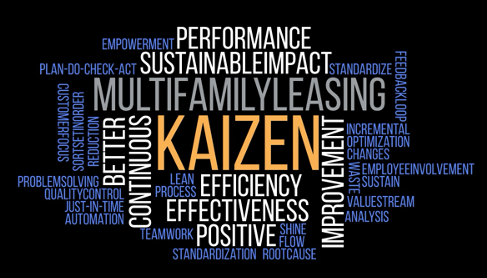
Streamlined Innovation in Multifamily Leasing through Kaizen: Achieving Sustained Impact

Introduction
The concept of Kaizen, which translates to “continuous improvement” from Japanese, has significantly influenced global business practices. It advocates for incremental, consistent changes that culminate in substantial improvement over time. My initial encounter with Kaizen was as a novice in the training department of a Japanese firm, an experience that laid the groundwork for my subsequent career in the multifamily sector.
Implementing Kaizen in Leasing Operations
My introduction to professional life was within the disciplined environment of a Japanese corporation, steeped in the principles of Kaizen. This philosophy was embraced company-wide, from executives to frontline staff, who continuously identified inefficiencies and devised improvements.
In multifamily leasing, Kaizen has been a game-changer, promoting the active participation of all employees in enhancing leasing methods. Drawing on twenty years in the sector, I consider Kaizen pivotal to fostering a vibrant leasing environment where constant improvement underpins operational excellence.
Cooperative Advancements in Leasing
The formative years of my career involved engaging in quality improvement teams, a significant influence on my mission to refine leasing practices to achieve and maintain performance excellence. This team-based, incremental improvement approach fosters a leasing environment that values everyone’s input, from staff to leadership.
Kaizen and Leasing Performance Tools
A pressing challenge in the multifamily leasing is the need for swift, reliable tools to identify and address leasing performance issues. For leadership to make impactful decisions, the practical application of Kaizen principles is crucial, which includes leveraging advanced technology and thorough data analytics. This enables a rapid discovery of areas ripe for improvement. By combining this data-driven approach with targeted training and coaching, we can further amplify our team’s capabilities. This dual strategy not only expedites the rollout of solutions but also cultivates a more proficient and knowledgeable team. The synergy of ongoing professional development and insightful data analysis leads to heightened team performance, augmented skills, and ultimately, improved financial outcomes for properties.
Strategic Kaizen Implementation
Kaizen celebrates daily successes, treating each completed goal as an achievement. The benefits of this philosophy are clear in the progress of teams and organizations that embrace this diligent, introspective problem-solving approach, enhancing efficiency and effectiveness.
In the competitive world of multifamily leasing, speed is essential. A Kaizen-based assessment tool enables continuous progress without the delays of conventional methods. This strategic Kaizen use is key to achieving operational nimbleness and financial success.
Beyond Kaizen Principles
Building on Kaizen’s foundations, another vital aspect of Japanese culture I’ve adopted is the principle of “ease for the next person.” This maxim is a solid base for continuous improvement, encouraging the notion that change starts with the individual.
The essence of Kaizen in multifamily leasing is fostering a culture where each person’s deliberate efforts ease and advance the whole leasing process. It highlights how an individual’s ability to drive positive change can significantly affect the community and organizational success.
Conclusion
Embracing Kaizen within the multifamily leasing realm goes beyond adopting a business methodology; it’s about integrating intelligent, timely tools that enhance a culture of effectiveness. My path with Kaizen, from its Japanese roots to its practical application in multifamily leasing, underscores its broad applicability and its transformative potential for enacting significant, profitable change through focused, immediate actions.
Geri Bettencourt, MBA | Co-Founder and Executive Vice President
Kaizen Principles, Data Analytics in Leasing, Cultural Transformation